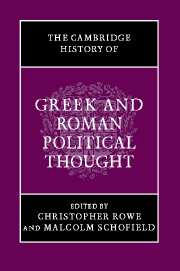Book contents
- Frontmatter
- Introduction
- PART I ARCHAIC AND CLASSICAL GREECE
- 1 Greek political thought: the historical context
- THE BEGINNINGS
- 2 Poets, lawgivers, and the beginnings of political reflection in archaic Greece
- 3 Greek drama and political theory
- 4 Herodotus, Thucydides and the sophists
- 5 Democritus
- 6 The Orators
- 7 Xenophon and Isocrates
- 8 Socrates and Plato: an introduction
- 9 Socrates
- 10 Approaching the Republic
- 11 The Politicus and other dialogues
- 12 The Laws
- 13 Plato and practical politics
- 14 Cleitophon and Minos
- ARISTOTLE
- PART II THE HELLENISTIC AND ROMAN WORLDS
- Epilogue
- Bibliographies
- Index
- Map 1. Greece in the fifth century bc"
- References
3 - Greek drama and political theory
from THE BEGINNINGS
Published online by Cambridge University Press: 28 March 2008
- Frontmatter
- Introduction
- PART I ARCHAIC AND CLASSICAL GREECE
- 1 Greek political thought: the historical context
- THE BEGINNINGS
- 2 Poets, lawgivers, and the beginnings of political reflection in archaic Greece
- 3 Greek drama and political theory
- 4 Herodotus, Thucydides and the sophists
- 5 Democritus
- 6 The Orators
- 7 Xenophon and Isocrates
- 8 Socrates and Plato: an introduction
- 9 Socrates
- 10 Approaching the Republic
- 11 The Politicus and other dialogues
- 12 The Laws
- 13 Plato and practical politics
- 14 Cleitophon and Minos
- ARISTOTLE
- PART II THE HELLENISTIC AND ROMAN WORLDS
- Epilogue
- Bibliographies
- Index
- Map 1. Greece in the fifth century bc"
- References
Summary
Tragedy compromises political theory. From the very beginnings of philosophy as a discipline, there has been an uneasy and often conflictual relation between the way that philosophy defines its theoretical project, and the questions that drama allows. Plato, the first policeman of political thought, invents - and founds - a history of struggle between poetry and philosophy and, notoriously, banned drama from his Republic for ethical, psychological and epistemological reasons. Yet the ambivalence of his evident attraction to the poetry he dismisses at such length also leads to an anecdotal tradition that before he embarked on philosophy, even Plato wrote tragic verse. Aristotle attempted to save drama for pedagogy: he allowed theatre a role in the education of the philosophically trained man at least. Yet Aristotle, for all that he set himself critically against his teacher Plato’s arguments, also contributed to the devaluation and exclusion of drama both by his development of philosophy as a privileged and formal system of argumentation, and by his recognition of a peculiar pleasure in tragedy: ‘tragic pleasure’ has often since been utilized to impugn the seriousness of theatre’s teaching. Many modern philosophers have followed Plato’s lead, and mention drama or other literature solely to dismiss the play of narrative and character from the rigorous field of theory. Nietzsche, from his oblique perspective on the discipline of philosophy, formulates a particularly influential and striking view of this rejection of drama when he argues that ‘Socratism’ destroyed tragedy: rationalist argument, embodied in the figure of Socrates, brings about the - tragic - death of the Dionysiac spirit of tragedy.
- Type
- Chapter
- Information
- Publisher: Cambridge University PressPrint publication year: 2000
References
- 20
- Cited by

